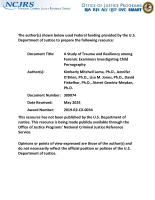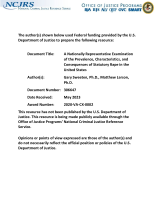Statutory Rape
Sexual Exploitation of Children: A Working Guide to the Empirical Literature
Exposure to Child Sexual Abuse Material among Law Enforcement Investigators: Exploring Trauma and Resilience Profiles
Emotional Wellbeing and Cognitive Appraisals among Law Enforcement Exposed to Child Sexual Abuse Material: A Mixed Methods Study
Sexual Posttraumatic Stress among Investigators of Child Sexual Abuse Material
Trauma Behind the Keyboard: Exploring Disparities in Child Sexual Abuse Material Exposure and Mental Health Factors among Police Investigators and Forensic Examiners, A Network Analysis
Correlates of Intimate Relationship Satisfaction Among Investigators of Child Sexual Abuse
A Self-assessment Tool for Helping Identify Police Burnout Among Investigators of Child Sexual Abuse Material
The Mental Health of Officials who Regularly Examine Child Sexual Abuse Material: Strategies for Harm Mitigation
A Study of Trauma and Resiliency among Forensic Examiners Investigating Child Pornography
The Prevalence of Child Sexual Abuse with Online Sexual Abuse Added
Predictors of Non-offending Caregiver Support in Cases of Child Sexual Abuse
Older Opposite-Sex Romantic Partners, Sexual Risk, and Victimization in Adolescence
Child sexual abuse images, youth produced images and the varieties of image-based sexual exploitation and abuse
Which dynamics make online child sexual abuse and cyberstalking more emotionally impactful: perpetrator identity and images?
A Nationally Representative Examination of the Prevalence, Characteristics, and Consequences of Statutory Rape in the United States
UAA Research on Violence Against Women
Sexual Assault in Alaska
Sexual Violence in Alaska
A nationally representative examination of the prevalence, characteristics, and consequences of statutory rape in the United States
Prosecuting Sexual Assault: A Comparison of Charging Decisions in Sexual Assault Cases Involving Strangers, Acquaintances, and Intimate Partners
How Collaboration Between Researchers and Police Chiefs Can Improve the Quality of Sexual Assault Investigations: A Look at Los Angeles
Panelists discuss the application of research findings from an NIJ-sponsored study of sexual assault attrition to police practice in Los Angeles. There are three main focal points: (1) the mutual benefits of researcher/practitioner partnerships, (2) the implications of variation in police interpretation of UCR guidelines specific to clearing sexual assault (with an emphasis on cases involving nonstrangers), and (3) the content of specialized training that must be required for patrol officers and detectives who respond to and investigate sex crimes.
See the YouTube Terms of Service and Google Privacy Policy




